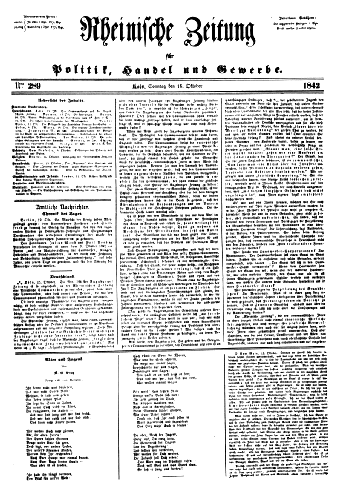
Rheinische Zeitung
Encyclopedia

Germany
Germany , officially the Federal Republic of Germany , is a federal parliamentary republic in Europe. The country consists of 16 states while the capital and largest city is Berlin. Germany covers an area of 357,021 km2 and has a largely temperate seasonal climate...
newspaper
Newspaper
A newspaper is a scheduled publication containing news of current events, informative articles, diverse features and advertising. It usually is printed on relatively inexpensive, low-grade paper such as newsprint. By 2007, there were 6580 daily newspapers in the world selling 395 million copies a...
, edited most famously by Karl Marx
Karl Marx
Karl Heinrich Marx was a German philosopher, economist, sociologist, historian, journalist, and revolutionary socialist. His ideas played a significant role in the development of social science and the socialist political movement...
.
The paper was founded on January 1, 1842 with a reformist pro-democracy
Democracy
Democracy is generally defined as a form of government in which all adult citizens have an equal say in the decisions that affect their lives. Ideally, this includes equal participation in the proposal, development and passage of legislation into law...
editorial slant, providing an outlet for the Rhine region's middle-class and intellectuals, who were increasingly opposed to Prussia
Prussia
Prussia was a German kingdom and historic state originating out of the Duchy of Prussia and the Margraviate of Brandenburg. For centuries, the House of Hohenzollern ruled Prussia, successfully expanding its size by way of an unusually well-organized and effective army. Prussia shaped the history...
n authoritarianism. Max Stirner
Max Stirner
Johann Kaspar Schmidt , better known as Max Stirner , was a German philosopher, who ranks as one of the literary fathers of nihilism, existentialism, post-modernism and anarchism, especially of individualist anarchism...
published The False Principle of our Education
The False Principle of our Education
The False Principle of Our Education - or Humanism and Realism is an article written by Max Stirner and published in the Rheinische Zeitung in April 1842.Stirner begins by stressing the importance of education: "the school question is a life question."...
in April, and Marx first published in the paper on May 5, 1842. His article against Prussian government censorship, published anonymously with the credit "by a Rhinelander," was widely lauded in the progressive community. He followed with more articles on the subject through the rest of May, producing a six-part series on freedom of the press. The positive response to this series served to increase the paper's circulation and influence.
In October 1842, Marx was named editor of the paper. On November 16, Friedrich Engels
Friedrich Engels
Friedrich Engels was a German industrialist, social scientist, author, political theorist, philosopher, and father of Marxist theory, alongside Karl Marx. In 1845 he published The Condition of the Working Class in England, based on personal observations and research...
visited the paper's offices on his way to England, meeting Marx for the first time and starting what would become a long period of collaboration between the two, lasting until Marx's death. Engels sent back a series of articles for publication in the Rheinische Zeitung from England, chronicling the conditions amongst the working class there; these would later be collected and published in his influential book, The Condition of the Working Class in England.
Under Marx's guidance, with additional influence from Engels, the paper began to take a more radical stance, openly opposing government policies with increasing stridency. An article by Marx critically discussing the relationship between the Prussian government and the Roman Catholic Church
Roman Catholic Church
The Catholic Church, also known as the Roman Catholic Church, is the world's largest Christian church, with over a billion members. Led by the Pope, it defines its mission as spreading the gospel of Jesus Christ, administering the sacraments and exercising charity...
was censored by the state and never published; several other of his articles opposing government policies were allowed to be published, but drew intense scrutiny.
By early 1843 Marx was promoting dangerously radical ideologies through the paper, increasingly espousing socialist
Socialism
Socialism is an economic system characterized by social ownership of the means of production and cooperative management of the economy; or a political philosophy advocating such a system. "Social ownership" may refer to any one of, or a combination of, the following: cooperative enterprises,...
and communist
Communism
Communism is a social, political and economic ideology that aims at the establishment of a classless, moneyless, revolutionary and stateless socialist society structured upon common ownership of the means of production...
viewpoints and nearly openly calling for a revolution to replace the Prussian monarchy
Monarchy
A monarchy is a form of government in which the office of head of state is usually held until death or abdication and is often hereditary and includes a royal house. In some cases, the monarch is elected...
with a democracy
Democracy
Democracy is generally defined as a form of government in which all adult citizens have an equal say in the decisions that affect their lives. Ideally, this includes equal participation in the proposal, development and passage of legislation into law...
. The Prussian government had heard enough—on March 17, 1843 he resigned due to the censorship's being placed on his newspaper by the Prussian government, and the paper was shut down on March 31.
Marx went on to found the Neue Rheinische Zeitung
Neue Rheinische Zeitung
The Neue Rheinische Zeitung - Organ der Demokratie was a German daily newspaper, published by Karl Marx in Cologne between June 1, 1848 and May 19, 1849. Its name refers to a paper earlier edited by Marx, the Rheinische Zeitung...
("New Rhenish Newspaper") in 1848.

